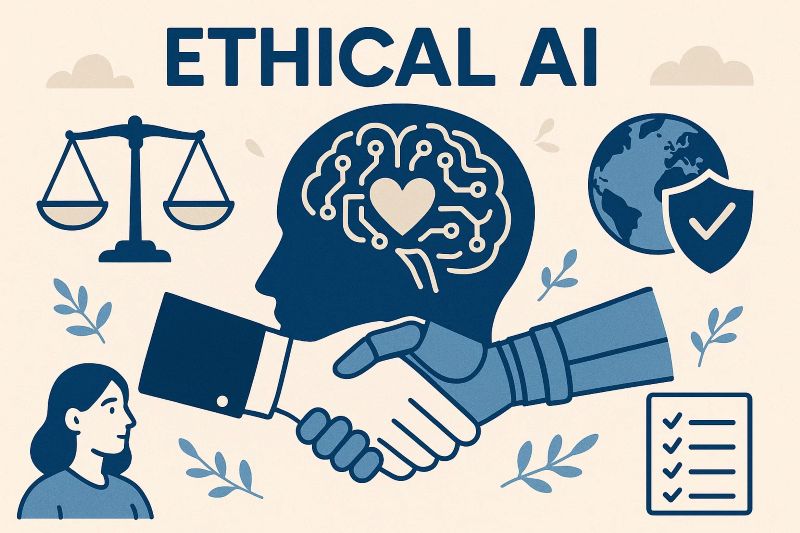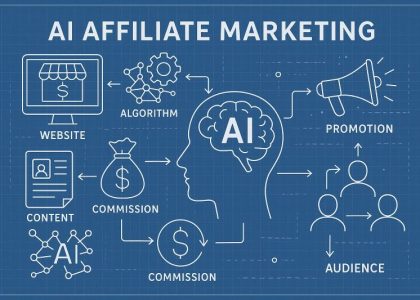Ethical considerations in Artificial Intelligence (AI) have become more important than ever, as the technology actively transforms industries, enhances customer experiences, and drives global innovation. From predictive analytics to generative models, AI unlocks endless possibilities, but it also brings new challenges that demand responsibility.
Businesses, developers, and policymakers must find the right balance between innovation and responsibility to ensure that AI benefits society without undermining human values.
Why Ethical AI Matters
AI now influences decision-making in sensitive areas such as healthcare, finance, recruitment, education, and security. Without ethical safeguards, unchecked algorithms can create bias, discrimination, and privacy risks.
Ethical AI ensures that innovation supports progress without sacrificing fairness, transparency, or accountability.
The importance of ethical AI lies in:
- Trust – People are more likely to adopt AI when they believe in its reliability.
- Transparency – Clear explanations of AI decisions boost user confidence.
- Accountability – Developers and organizations must own the outcomes of their AI systems.
- Inclusivity – AI should serve diverse communities fairly, avoiding bias or discrimination.
Key Principles of Ethical AI
To balance growth with responsibility, AI systems should follow these guiding principles:
1. Fairness and Non-Discrimination
AI must avoid reinforcing existing biases. Using diverse datasets and testing models for fairness are essential to ensure inclusivity.
2. Transparency
Users should understand how AI systems make decisions. Black-box algorithms often create mistrust and limit accountability.
3. Privacy Protection
Respecting user data is crucial. AI must comply with global privacy regulations such as GDPR and ensure safe handling of personal information.
4. Accountability
Organizations should take responsibility for AI outcomes and establish clear frameworks for reporting errors or misuse.
5. Human-Centric Approach
AI should support human decision-making rather than replace or harm it. Human oversight is vital, especially in high-stakes situations.
The Challenges of Implementing Ethical AI
While these principles sound straightforward, applying them is complex. Some common challenges include:
- Biased Data – Poor or incomplete datasets create unfair or inaccurate results.
- Lack of Regulations – Many regions lack strict AI governance, leaving ethical gaps.
- Corporate Pressure – The race for innovation sometimes pushes businesses to compromise on ethics.
- Global Differences – Cultural values and ethical standards vary, making universal AI policies difficult to establish.
Balancing Innovation and Responsibility
The solution isn’t to stop AI development but to guide it responsibly. Organizations can strike the right balance by:
- Adopting AI Ethics Frameworks – Following guidelines such as UNESCO’s Ethical AI principles or OECD standards.
- Building Explainable AI (XAI) – Creating models that are transparent and easy to interpret.
- Continuous Auditing – Regular monitoring of AI systems to detect bias or errors.
- Collaboration Between Sectors – Encouraging cooperation among developers, policymakers, and ethicists.
- Educating Teams – Training developers and employees to adopt responsible AI practices.
The Future of Ethical AI
The future of AI will depend on how well we integrate ethics into innovation. In the coming years, we can expect:
- Governments to enforce stricter AI regulations.
- Businesses to see responsible AI as a competitive advantage.
- Consumers to choose brands that prioritize transparency and fairness.
- Ethical AI to foster trust, drive innovation, and ensure long-term sustainability.
Final Thoughts
Ethical AI is not about slowing down progress — it’s about ensuring innovation benefits humanity responsibly. By focusing on fairness, transparency, and accountability, businesses can balance growth with responsibility and build long-term trust in the AI era.





